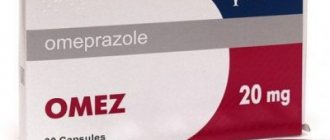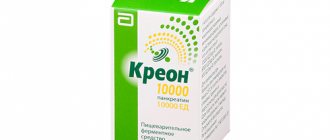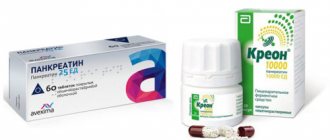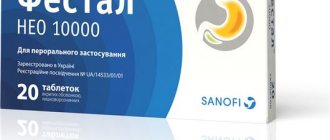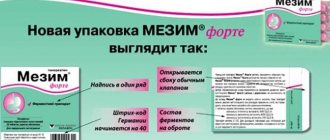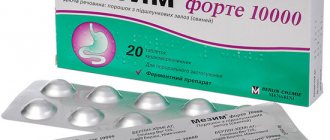Instructions
Deterioration of the excretory (exocrine) function of the pancreas leads to impaired absorption of food and a lack of basic macro- and microelements. Enzyme deficiency is manifested by pain, nausea, diarrhea and other unpleasant symptoms.
To compensate for enzyme deficiency, Festal or Creon, as well as other pancreatin-based products, are prescribed.
How do they affect the body?
The main active component of Festal and Creon is an extract of pancreatic juice of pigs or cattle - pancreatin. It consists of 3 types of enzymes: lipase, which determines the dosage of all enzyme preparations, amylase and proteinases.
The first of the enzymes is responsible for lipolysis (the breakdown of fats) and the absorption of fat-soluble vitamins in the intestines. Amylase helps break down starch into monosaccharide residues (simple carbohydrates), which are sources of energy. Proteinases ensure the absorption of amino acids from proteins.
With exocrine pancreatic insufficiency, fats, proteins and complex carbohydrates are not completely digested. This leads to hypovitaminosis A, E, K and D3, gastrointestinal disorders and weight loss. It is possible to improve the absorption of macro- and micronutrients only by introducing additional sources of enzymes (Creon, Festal).
Pharmacological effects
Creon capsules dissolve under the action of gastric juice and release many mini-spheres with an enteric coating. The same shell protects units of the drug Festal.
When the drugs reach the intestines, the coating dissolves and releases proteases, lipase and amylase. They break down incoming nutrients and ensure their absorption in the small intestine.
Festal additionally contains hemicellulase, bile extract and bile acids. Hemicellulase partially breaks down fiber, which helps reduce gas formation in the intestines. Bile components stimulate the secretion of bile and its own lipase, which facilitate the absorption of fatty acids.
Composition of drugs
All three medicines are enzymatic medicines. Their main substance is pancreatin, which in its structure contains pancreatic enzymes of domestic animals. Components of the pig organ are mainly used. All three drugs contain the same components for the absorption of food:
Composition of enzyme preparations
- Amylase - breaks down carbohydrates into simple sugars.
- Lipase - helps to absorb fats that come into the body with food.
- Protease - proteins.
In addition to the main components, each of the drugs contains additional ones. Festal contains hemicellulose and bile. Mezim - polysorbate, titanium dioxide, milk sugar, hypromellose.
Differences and similarities between the two drugs
The differences between Creon and Festal are observed in the following:
- Dosage of enzymes. The enzyme content in Creon is higher than in Festal. At the minimum dosage of lipase in the drug Creon (10,000 units), the content of amylase and proteases is 8,000 units and 600 units. For Festal, the concentration of these enzymes is 6000 IU, 4500 IU and 300 IU, respectively.
- Availability of additional components. The effect of Creon is based only on the pharmacological effects of pancreatin, and Festal additionally contains hemicellulase and bile extracts.
- Release form and particle sizes of the drug. Creon is available in the form of capsules (the shell is soluble in gastric juice) filled with microspheres with pancreatin. Festal is supplied in the form of dragees with an acid-resistant coating.
- Number of contraindications. Festal has a greater number of indications: additional components of this medicine can cause exacerbation of other gastrointestinal diseases.
- Cost of medicine. The price of Creon (in the minimum dosage) is 2-2.5 times higher than the cost of Festal.
Which is better: Festal or Creon?
| A drug | Advantages | Flaws |
| Creon | Several dosage options Use for children, pregnant women, patients with liver dysfunction, etc. Possibility of dividing small doses of enzymes if necessary | High cost Presence of side effects when taking high doses of lipase |
| Festal | Use for disorders of the formation and movement of bile, certain liver diseases Lower dosage of enzymes (convenient dosage regimen for preventive purposes) Low cost | Less uniform distribution in the intestines, reduced effectiveness More contraindications and adverse reactions Inability to use for children under 3 years of age and patients with swallowing disorders |
What is better Festal or Mezim: advantages and disadvantages of each of them
IMPORTANT!
The natural remedy
Nutricomplex
restores proper metabolism in 1 month. Read the article.
What is the difference between Mezim and Festal? These drugs differ from each other, primarily in their composition.
The active substance of Mezim is pancreatin - an enzyme agent that is obtained from the pancreas of animals.
It contains the following enzymes:
Festal has a more complex composition. One of the active components is also pancreatin. In addition to it, Festal contains 2 other active ingredients:
Festal is produced in the form of white, round dragees, covered with a coating, which dissolves as soon as the medicine enters the intestines. The drug has a slight vanilla scent.
Indications and contraindications
Application area
Festal and Mezim have common indications for use. They are prescribed in the following cases:
What then is the difference between Festal and Mezim? These drugs differ in their contraindications for use.
Contraindications
Both of these medications are contraindicated if the patient has:
- hypersensitivity to the composition of the drug;
- acute pancreatitis or chronic inflammation of the pancreas beyond the stage of remission.
Important! Some patients suffering from cystic fibrosis, when taking Festal and Mezim in large dosages, may develop stenosis of the valve of the Tower.
IMPORTANT!
How to remove bags and wrinkles around the eyes at 50 years old? Read the article.
In addition, Festal is contraindicated in patients suffering from the following pathologies:
Festal is not prescribed to patients under 3 years of age. This is due to the fact that a small child cannot swallow the pills whole. After all, if the enteric coating is broken, the enzymes will be destroyed under the influence of hydrochloric acid in the gastric juice and there will be no effect from taking Festal.
Mezim can also be prescribed to children only if they can swallow the tablet whole.
Important! Festal and Mezim can be prescribed to pregnant women and breastfeeding women with caution, since there is not enough data on the safety of using enzyme preparations in these categories of citizens.
Undesirable effects and cases of overdose
While taking Mezim and Festal, the same adverse reactions may occur:
If recommended doses are exceeded, hyperuricemia and hyperuricosuria may occur. In this case, you need to interrupt treatment. There is no antidote; drugs are prescribed that eliminate the symptoms of overdose.
Admission rules
Important! Mezim is very often counterfeited. To find out whether the drug is real or not: there is a hologram in the upper left corner; if you erase it, you can find the letter M.
Festal and Mezim should not be taken simultaneously with antacids whose active substances are magnesium hydroxide or calcium carbonate, since in this case the effectiveness of enzyme preparations may decrease.
While taking Mezim and Festal, the absorption of medications containing iron may decrease.
In addition, when taking Festal cimetidine simultaneously, the effect of enzymes is enhanced.
When taking Festal in parallel with antibiotics, sulfonamides and PAS, the adsorption of the latter increases.
Despite the fact that both medications are available without a doctor’s prescription, you cannot take them on your own, as they have their own contraindications for use. In addition, with frequent use of enzyme preparations, the pancreas will stop producing enzymes itself, so it is better to follow a diet, avoid fatty, fried foods, and alcoholic beverages.
Analogues of Festal and Mezim
A complete analogue of Mezim is Pancreatin, which has the same indications, prescription restrictions, and undesirable effects.
Therefore, in case of cholelithiasis, preference should be given to Mezim or Pancreatin.
Instead of Creon, children can be given Micrasim. It also contains pancreatin and is available in gelatin capsules containing pellets - solid particles coated with an enteric coating, the size of which varies from 2000 to 5000 microns. But Mikrasim costs less than Creon.
But perhaps it would be more correct to treat not the effect, but the cause?
We recommend reading the story of Olga Kirovtseva, how she cured her stomach. Read the article
for information, possible contraindications, consultation with a doctor is MANDATORY! Do not engage in self-diagnosis and self-medication!
- Indications for the use of imodium - treatment of digestive disorders
- Flit is a highly effective drug in preparation for manipulations on the large intestine
- To whom and from what will Lanzoptol help?
- Probiotics in human life: mechanisms of action and main characteristics
- Stomach diseases
- Gastritis
- Gastroduodenitis
- Gastroenteritis
- Gastroenterocolitis
- Stomach acidity
- Erosion
- Ulcer
- Pancreatic diseases
- Pancreatitis
- Pancreas
- Gallbladder diseases
- Cholecystitis
- Diseases of the esophagus
- Esophagitis
- Bowel diseases
- Appendicitis
- Haemorrhoids
- Dysbacteriosis
- Constipation
- Colitis
- Diarrhea
- Enterocolitis
- Other
- Diagnostics
- Other diseases
- Vomit
- Healthy foods
- Drugs
- Kidney diseases
- Analysis of urine
- Kidney anatomy
- Other kidney diseases
- Kidney cyst
- Urolithiasis disease
- Nephritis
- Nephrosis
- Nephroptosis
- Kidney cleanse
- Kidney failure
- Bladder diseases
- Urination
- Bladder
- Ureters
- Vladimir 27.12.
The materials on the site are for informational purposes, for any questions related to health, consultation
consultation with your doctor is required! Do not engage in self-diagnosis and self-medication!
Indications for use
Enzymatic agents are used for the following indications:
- enzyme deficiency in elderly patients, against the background of chronic pancreatitis, cystic fibrosis and Shwachman-Diamond syndrome,
- malignant neoplasia of the pancreas and bile ducts,
- condition after irradiation or complete or partial removal of the stomach, gall bladder, pancreas,
- other gastrointestinal diseases that complicate the function of the digestive gland (cirrhosis, gastrostasis, cholestatic inflammation of the liver, etc.),
- excessive microbial growth in the small intestine,
- pain under the left ribs, heaviness in the abdomen, nausea and diarrhea due to poor nutrition,
- preparation for radiography or ultrasound of the abdominal organs.
The following pathologies may be indications for taking Festal:
- disturbances in the movement of bile (with GIB, malabsorption, etc.),
- disorder of neurohumoral regulation of the formation and separation of bile in chronic gastrointestinal diseases (gastritis, gastroduodenitis, cholecystitis),
- alcoholic and toxic liver damage.
For cystic fibrosis and digestive disorders during pregnancy, Festal is used with caution.
Festal
Available in the form of dragees, which have a protective shell. The main components are pancreatin , bovine bile powder. An enzyme preparation that promotes digestive improvements. Provokes rapid breakdown and absorption of proteins in the small intestine. It has a lipolytic and amlylolytic effect.
Through the action of bile extract, emulsification of fats is provoked, lipase activity is seriously increased, which in the process creates optimal conditions for the breakdown of fat-soluble vitamins. The main properties ensure improvement of the basic functions of the gastrointestinal tract, digestion is normalized.
Thanks to the acidic shell, an effect is created in the small intestine and inactivation of enzymes is prevented.
Indications:
- For various diseases that are accompanied by dysfunction of the pancreas.
- For chronic pancreatitis (do not take during an exacerbation).
- To improve digestion in case of ulcerative lesions of the gastrointestinal tract.
- After operations on the gastrointestinal tract.
- In case of violation of the nutritional regime (consumption of unusual food).
- If chewing function is impaired, long-term immobilization.
- Preparation for examination of the gastrointestinal tract.
- For the absorption of fat-soluble vitamins and certain types of antibiotics.
Intolerance to certain components provokes the inability to prescribe the drug. It is not used for intestinal obstruction, during exacerbation of pancreatitis, as well as for hepatitis and mechanical jaundice. Use with caution and as prescribed by a doctor in the treatment of pregnant women.
Directions for use and dosage
Enzymatic agents are taken during or after meals. 1/3-1/2 doses can be taken immediately before meals, if the number of units of medication is more than 1. Capsules and dragees are swallowed whole, with plenty of water.
For hypofunction of the digestive gland, the dose of Creon is from 25,000 to 80,000 units (calculated for lipase). This corresponds to 2-8 capsules depending on the dosage.
For cystic fibrosis, the daily dose of medication is selected according to age and weight: for patients under 4 years of age, the recommended initial dose is 1000 IU of lipase per 1 kg of body weight, for patients over 4 years old - 500 IU per 1 kg. If clinical improvement is unsatisfactory, the dosage is increased (but not more than 10,000 units/kg).
Festal is prescribed in a dose of 1-2 tablets 3 times a day throughout therapy. To prepare for the study, it is recommended to drink 2 tablets 2-3 times a day for 2-3 days before the procedure.
Reviews from doctors
Elena (therapist), 43 years old, Yekaterinburg.
Festal is an effective enzyme agent. It improves digestion and is prescribed in the preparatory period before a planned ultrasound examination or x-ray. The therapeutic properties of the drug make it possible to include it in the treatment of a wide range of pathological conditions of the digestive system.
The medicine is well suited for eliminating digestive problems in the 1st trimester of pregnancy. Festal helps reduce the process of gas formation in the intestines and prevents constipation from developing. The disadvantages of the enzyme agent include a number of contraindications that should be taken into account.
Oleg (gastroenterologist), 34 years old, Tula.
Creon is an excellent enzyme preparation that includes pancreatin. The product is simply irreplaceable in eliminating problems with the pancreas. The drug has virtually no side effects, allergic reactions to its components are rare. I consider its high price to be one of the most significant drawbacks. Before using the medicine, you must consult your doctor.
Enzyme medicine should be selected individually in each case by the attending physician.
special instructions
Products based on enzymes and bile are prescribed taking into account the age and health status of the patient.
Pregnancy and lactation
Prescribing both drugs during pregnancy is possible only if the benefit to maternal health is significantly higher than the risk of problems in the fetus. Large doses of enzymes (Creon) can negatively affect the absorption of vitamin B9 and iron, which are necessary for the growth and development of the child.
Pancreatin does not have a toxic effect on the body of a newborn during lactation.
Childhood
The use of both drugs to treat children is acceptable. Therapy should be carried out in accordance with the prescriptions of a gastroenterologist or pediatrician. When taking pancreatin in high doses, children may develop constipation and perianal irritation.
Dragee Festal is prohibited for use in children under 3 years of age.
Elderly age
Creon is used to treat patients over 60 years of age without dose adjustment due to chronic pathologies of internal organs.
Festal is not prescribed to patients with liver failure, cholelithiasis and a number of other pathologies that can be observed in older people.
For swallowing disorders in young children, bedridden and elderly patients, Creon capsules should be opened and microspheres added to soft food or acidic drinks - yogurt and juice (with a pH less than 5.5). It is prohibited to divide and crush the dragees.
Which is better Creon or Pancreatin
Often, having any health problems, people self-medicate. They buy and take medications on their own. And the main guideline when choosing a treatment is advertising, advice from a neighbor and, of course, price.
Based on superficial knowledge and the false judgment that if a medical product contains the same substance, then they are both the same, the only difference is the cost and the country of manufacture. For example, many people believe that such products as Mezim, Pancreatin, Creon and Penzital are one and the same. But this is a misconception.
These drugs still have differences, and although it cannot be said unequivocally that Pancreatin or Creon is better, in some cases one has an advantage over the other.
Contraindications to the use of Festal and Creon
General contraindications to taking Festal and Creon are:
- acute pancreatitis,
- exacerbation of inflammation of the pancreas,
- individual sensitivity to the components of the drug.
Festal is also contraindicated in the following pathologies:
- liver failure, chronic inflammation (hepatitis), precoma and coma of the liver,
- high concentration of bilirubin,
- obstructive jaundice, empyema and gallstones,
- intestinal obstruction, diarrhea,
- peptic ulcer and erosion of the stomach and duodenum,
- duodenogastric reflux.
Characteristics of Creon
Creon is an enzymatic agent for normalizing digestion.
The components of the therapeutic substance help the body break down proteins, fats and carbohydrates.
As a result of its use, food is digested better and symptoms that indicate insufficient functioning of the pancreas are eliminated.
The following physiological and pathological conditions may be the reason for prescribing Creon:
- the presence of chronic gastric and intestinal diseases;
- low functional activity of the pancreas;
- recovery after surgery on the digestive system;
- cystic fibrosis;
- the presence of obstruction of the pancreatic duct caused by the appearance of a tumor, blockage by stones or parasites;
- preparing for x-rays or ultrasound diagnostics.
There are few restrictions on the use of Creon. The most significant of them is hypersensitivity to the constituent components of the drug.
Creon is approved for the treatment of pregnant and lactating women.
But during therapy, some side effects are possible, including:
- disturbances in the functioning of the gastrointestinal tract, manifested by dyspeptic symptoms;
- skin rash;
- decrease in the amount of glucose in the blood.
Self-treatment with an enzyme preparation can harm the functioning of the pancreas. Therefore, the appropriateness of therapy, dosage and duration of treatment should be determined individually by the attending physician.

